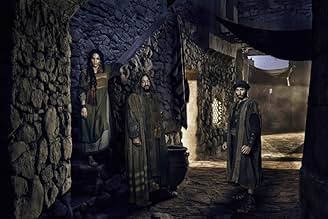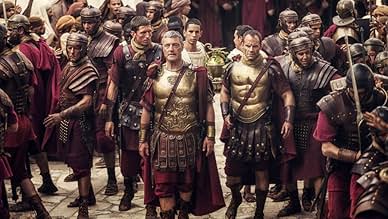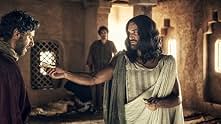IMDb-BEWERTUNG
7,4/10
5600
IHRE BEWERTUNG
Füge eine Handlung in deiner Sprache hinzuFollows the book of Acts. Shows the complete message of Christ and the transformation of Saul to Paul and how the high priest of Judea does not believe in what has taken place after the Cruc... Alles lesenFollows the book of Acts. Shows the complete message of Christ and the transformation of Saul to Paul and how the high priest of Judea does not believe in what has taken place after the Crucifixion of Christ.Follows the book of Acts. Shows the complete message of Christ and the transformation of Saul to Paul and how the high priest of Judea does not believe in what has taken place after the Crucifixion of Christ.
- Auszeichnungen
- 2 Gewinne & 3 Nominierungen insgesamt
Folgen durchsuchen
Empfohlene Bewertungen
I really enjoyed this series as it is an intense, plot driven epic that has the viewer on edge and in anticipation for more. As a historical epic, it is great, but don't consider this to be a movie about the Book of Acts.
To keep a dramatic flair to the series, the producers have taken great liberties with regards to history. A lot of the stories are merged or expanded with extra details for the viewer's benefit and not based upon the actual biblical texts.
The portrayal of Pontius Pilate as a brutal tyrant was perhaps the most disappointing aspect of the series. Pilate's life, and his decision to have Christ executed, is a very deep subject and the series sadly did not address this well, simply portraying Pilate as a vicious killer who enjoyed spilling Jewish blood.
Overall, a great series, just don't hold it to Gospel (no pun intended) as a historical work about the early Church.
To keep a dramatic flair to the series, the producers have taken great liberties with regards to history. A lot of the stories are merged or expanded with extra details for the viewer's benefit and not based upon the actual biblical texts.
The portrayal of Pontius Pilate as a brutal tyrant was perhaps the most disappointing aspect of the series. Pilate's life, and his decision to have Christ executed, is a very deep subject and the series sadly did not address this well, simply portraying Pilate as a vicious killer who enjoyed spilling Jewish blood.
Overall, a great series, just don't hold it to Gospel (no pun intended) as a historical work about the early Church.
When I watched the first Bible miniseries, I was young enough that my parents had to screen the show first to see which episodes were graphic. (I was able to watch until the Crucifixion). I loved the series. I didn't know they had come out with A.D. until recently when my friends told me about it. I remembered that NBC's website has episodes of many TV shows that you can watch for free so today I had an A.D. marathon. Wow. I only made it through two episodes before I had to stop watching but I will definitely be watching more tomorrow. I'm not very picky when it comes to details in historical dramas such as Titanic, The Imitation Game, or this. I understand they have to spice it up a little to make it 'Hollywood worthy'. The only thing that bothers me is I think they changed some of the cast. This series really opened my eyes though. It makes you stop and think about the apostles. Sometimes I feel like when people read the Bible they assume the apostles knew what they were doing and that they foresaw things happening. This shows you that they were actual people who were terrified. They didn't know how things were going to end. Summery: I love this series! You should definitely go check it out!
I wonder at what point the writers and producers decided to toss our the Book of Acts and ignore history.
Some of the stories are fun to watch, but other stories are just plain wrong. Tiberius and Caligula never visited Jerusalem. Tiberius died on the Island of Capri and Caligula was there to testify of his death. Near the end of his life, after he thought he had turned into a living God, Caligula did order a statue of himself placed in the Jewish Temple at Jerusalem, but before his orders could be carried out he was assassinated. When he first came to power Caligula was very kind and benevolent, but he became ill and when he recovered, he had changed and thought he was now a God. Caligula was not even mentioned in Acts. I have no idea why this made up story of Tiberius and Caligula visiting Jerusalem added to the TV story. The truth is that Pilot died in 36 AD and Caligula did not become Emperor until 37 AD. Pilot was replaced by Festus and so far in the series he has yet to show up in the series.
I wish the producers had been smart enough to realize that real history can be exciting and dramatic and they did not have to change history to make the story interesting. It is also an insult to the intelligence of those who have studied history and have read the Bible and know the real stories to watch this show and see the drastic changes to the original stories. The Bible series was a bit more true to the Bible when it was on the History Channel, but now it is on a network so maybe NBC caring more about rating than real history wanted them to change history.
In the 50's Bible stories had some biblical and historical accuracy, but mostly went for glitz and spectral. More recent movies and TV shows reflected more historical and Biblical accuracy in their stories. Now we have taken a few steps back and have let the truth take a back seat to popular legend and ratings. When Pilate asked Jesus what is truth, He gave no answer. I suppose if Pilate were to ask the producers what is truth, they would say "What ever we want it to be." That is sad.
Some of the stories are fun to watch, but other stories are just plain wrong. Tiberius and Caligula never visited Jerusalem. Tiberius died on the Island of Capri and Caligula was there to testify of his death. Near the end of his life, after he thought he had turned into a living God, Caligula did order a statue of himself placed in the Jewish Temple at Jerusalem, but before his orders could be carried out he was assassinated. When he first came to power Caligula was very kind and benevolent, but he became ill and when he recovered, he had changed and thought he was now a God. Caligula was not even mentioned in Acts. I have no idea why this made up story of Tiberius and Caligula visiting Jerusalem added to the TV story. The truth is that Pilot died in 36 AD and Caligula did not become Emperor until 37 AD. Pilot was replaced by Festus and so far in the series he has yet to show up in the series.
I wish the producers had been smart enough to realize that real history can be exciting and dramatic and they did not have to change history to make the story interesting. It is also an insult to the intelligence of those who have studied history and have read the Bible and know the real stories to watch this show and see the drastic changes to the original stories. The Bible series was a bit more true to the Bible when it was on the History Channel, but now it is on a network so maybe NBC caring more about rating than real history wanted them to change history.
In the 50's Bible stories had some biblical and historical accuracy, but mostly went for glitz and spectral. More recent movies and TV shows reflected more historical and Biblical accuracy in their stories. Now we have taken a few steps back and have let the truth take a back seat to popular legend and ratings. When Pilate asked Jesus what is truth, He gave no answer. I suppose if Pilate were to ask the producers what is truth, they would say "What ever we want it to be." That is sad.
After the rousing success that was "The Bible", NBC brought the format back with "A.D.: The Bible Continues". While the ratings weren't near the original, in terms of quality the series was very well-done and just as entertaining as its predecessor.
The main plots of "A.D." revolve around three main topics:
1. The disciples of Jesus, led by Peter (Adam Levy), who are given the creed to preach His word. The problem, of course, is that Jerusalem is under strong Roman control, leading to unending conflict.
2. Pontius Pilate (Vincent Regan), Roman official stationed in Jerusalem, trying to deal with the "Jesus followers", while being advised by wife Claudia (Joanne Whalley).
3. Caiaphus (Richard Coyle), leader of the Jewish temple, and wife Leah (Jodhi May), who are caught in the middle of the Roman/Christian conflict.
The strength of this miniseries is that it shows a very intriguing "what could have been" scenario about the start of the spread of Christianity by the Disciples. You relaly get a look at how they were likely thinking/feeling in relation to their relationship with Jesus and his teachings. Too often, individuals from the Bible are looked upon as "larger than life" or somehow separated from the "average man". However, that was not the cause whatsoever. These are real people trying to comprehend the plan for God's kingdom, so obviously that is going to cause some mistakes to be made and many conflicts to arise. "A.D." doesn't shy away from any of that.
The acting and overall production value is also quite strong. This is a far cry from some cheesy re-enactment one might find on a religious network. "A.D." is a bona fide dramatic series. It just happens to be telling a story from the Bible instead of a story that someone penned in a script.
Simply put, I enjoyed "A.D." nearly as much as I did "The Bible" (the sheer breadth of the latter probably sneaks it ahead of the former by just a bit). I mainly appreciated how it didn't "preach" to the audience and chose rather to give a more individualized perspective of events: how the Disciples (and those around them) chose to react to the Resurrection and Jesus' creed to preach his word. Scholars of the Bible would likely enjoy this series, but I think its biggest fan-base would come from those who a bit more "layman" in terms of Biblical knowledge, for this one shows not just the faith of early Christians, but also the "nuts and bolts" of how that faith changed the world.
The main plots of "A.D." revolve around three main topics:
1. The disciples of Jesus, led by Peter (Adam Levy), who are given the creed to preach His word. The problem, of course, is that Jerusalem is under strong Roman control, leading to unending conflict.
2. Pontius Pilate (Vincent Regan), Roman official stationed in Jerusalem, trying to deal with the "Jesus followers", while being advised by wife Claudia (Joanne Whalley).
3. Caiaphus (Richard Coyle), leader of the Jewish temple, and wife Leah (Jodhi May), who are caught in the middle of the Roman/Christian conflict.
The strength of this miniseries is that it shows a very intriguing "what could have been" scenario about the start of the spread of Christianity by the Disciples. You relaly get a look at how they were likely thinking/feeling in relation to their relationship with Jesus and his teachings. Too often, individuals from the Bible are looked upon as "larger than life" or somehow separated from the "average man". However, that was not the cause whatsoever. These are real people trying to comprehend the plan for God's kingdom, so obviously that is going to cause some mistakes to be made and many conflicts to arise. "A.D." doesn't shy away from any of that.
The acting and overall production value is also quite strong. This is a far cry from some cheesy re-enactment one might find on a religious network. "A.D." is a bona fide dramatic series. It just happens to be telling a story from the Bible instead of a story that someone penned in a script.
Simply put, I enjoyed "A.D." nearly as much as I did "The Bible" (the sheer breadth of the latter probably sneaks it ahead of the former by just a bit). I mainly appreciated how it didn't "preach" to the audience and chose rather to give a more individualized perspective of events: how the Disciples (and those around them) chose to react to the Resurrection and Jesus' creed to preach his word. Scholars of the Bible would likely enjoy this series, but I think its biggest fan-base would come from those who a bit more "layman" in terms of Biblical knowledge, for this one shows not just the faith of early Christians, but also the "nuts and bolts" of how that faith changed the world.
This is no way a comprehensive review. I have enjoyed much of the series that I have seen so far. However, I was very disturbed by the portrayal of two of the early Church's supporters, Ananias and his wife Sapphira. The show indicates that they died because they did not contribute the whole of the proceeds of the sale of their property. While this is true, it is true because they lied about it, not because they were required to contribute 100% and did not. Acts chapter 5 makes it quite clear . . . "Didn't it belong to you before it was sold? And after it was sold, wasn't the money at your disposal? . . . You have not lied to men but to God." To me, the portrayal of the situation in the show frames God as a tyrant.
Wusstest du schon
- WissenswertesEmmett J Scanlan, who played Paul/Saul, said that after his baptism scene he sat down and burst into tears, saying he felt like a weight had been lifted off him.
- VerbindungenEdited into Resurrection (2021)
Top-Auswahl
Melde dich zum Bewerten an und greife auf die Watchlist für personalisierte Empfehlungen zu.
Details
- Erscheinungsdatum
- Herkunftsland
- Offizielle Standorte
- Sprache
- Auch bekannt als
- A.D. Kingdom and Empire
- Drehorte
- Produktionsfirmen
- Weitere beteiligte Unternehmen bei IMDbPro anzeigen
Zu dieser Seite beitragen
Bearbeitung vorschlagen oder fehlenden Inhalt hinzufügen











































